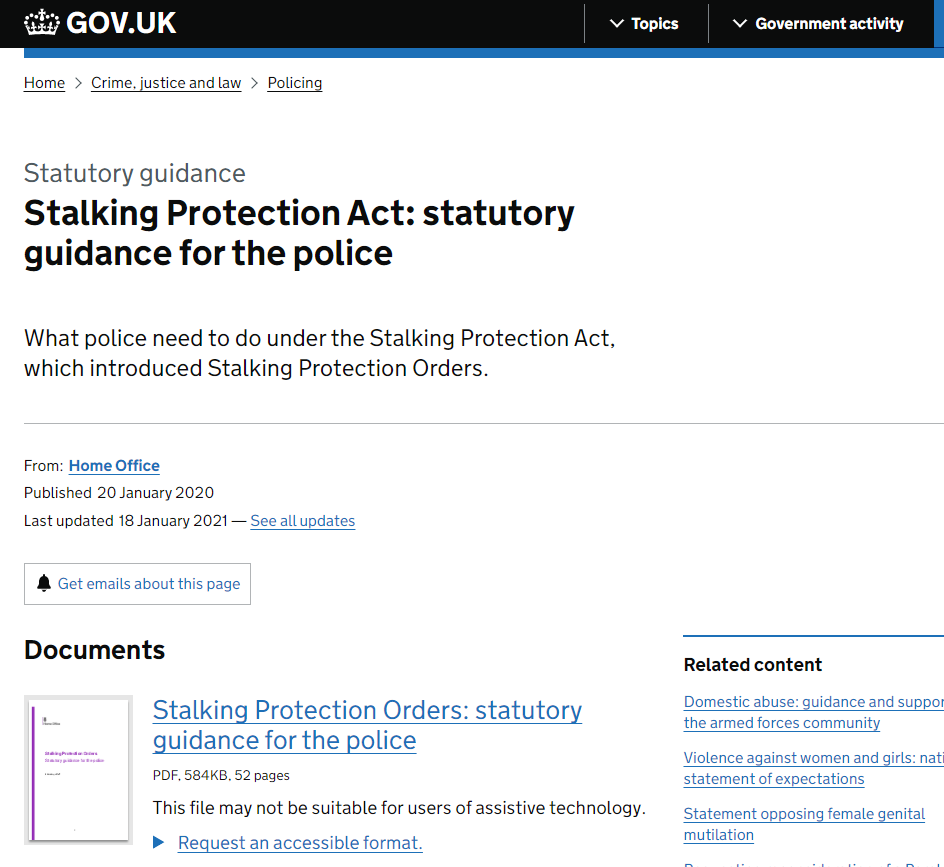What is stalking?
Stalking is a behaviour from another person which is persistent, unwanted, harassment and/or anything that causes a person any kind of fear or anxiety. This can include:
- unwanted or malicious communication
- assault
- unwanted attention which may include a person seeking a romantic relationship
- violent predatory behaviour
- sending gifts which are unwanted
- persistently following someone
- repeatedly going uninvited to their home
- monitoring someone’s use of the internet, email or other form of electronic communication
- loitering somewhere frequented by the person
- interfering with or damaging their property
- watching or spying on someone
- identity theft
Stalking is not a ‘one-off’ crime. It is a series of incidents which when taken in isolation can appear trivial but when put together they become more sinister.
How can I tell if someone is being stalked?
Sometimes it is difficult to know whether what is happening to someone is stalking or harassment, consider asking the following questions when working with someone who may be the victim of stalking:
- Are you frightened?
- Has the person engaged in harassment before (involving you and/or anyone else)?
- Has the person ever destroyed or vandalised your property?
- Has the person turned up at work, home, or somewhere else more than three times per week?
- Has the person loitered around your home, workplace or somewhere else?
- Has the person made any threats of physical or sexual violence?
- Has the person harassed any third party since the harassment began? (e.g. friends, family, children, colleagues, partners or neighbours)
- Has the person acted violently towards other people within the current stalking incidents?
- Has the person persuaded other people to help him/her? (wittingly or unwittingly)
- Is the person known to be abusing drugs and/or alcohol?
- Is the person known to have been violent in the past? (physical or psychological)
If they answered YES to any of the questions above, you should take the situation, and the person’s behaviour towards them, seriously.
How can the victim of stalking be protected?
Stalking Protection Orders (SPO) are intended to protect any person of any age experiencing stalking but they are not an alternative to prosecution. They allow:
- early police intervention
- pre-conviction
- to address stalking behaviours before they become entrenched or escalate in severity, and
- to protect victims from more serious harm
These orders are an effective means of managing an alleged suspect through the use of prohibitions and/or positive requirements as well as imposing notification requirements on the suspect.
The criminal threshold must be met for a full SPO to be made. However, the test to be applied for an interim SPO is lower and can be granted ‘if the court considers it appropriate to do so’.
Who can apply for an SPO?
An SPO application can only be made by the police. The police should consider applying for an order where it appears that:
- the suspect has carried out acts associated with stalking
- the suspect poses a risk of stalking someone
- there is reasonable cause to believe the proposed order
How long does an SPO last?
An SPO lasts for a fixed period (of at least two years from the date of the order) will be specified in the order or until a further order is made. Different time periods may be specified in relation to different prohibitions or requirements.
What if the order is breached?
A person who breaches and SPO or an interim SPO without reasonable excuse commits a criminal offence.
The police will investigate a breach of the order as the victim may not be aware of the full extent of the breach and/or the stalking.
An application for an SPO may itself also be a trigger for escalation by the stalker.
Where can I find more information?
Further information can be obtained from the Statutory Guidance available from:



 View all our news
View all our news